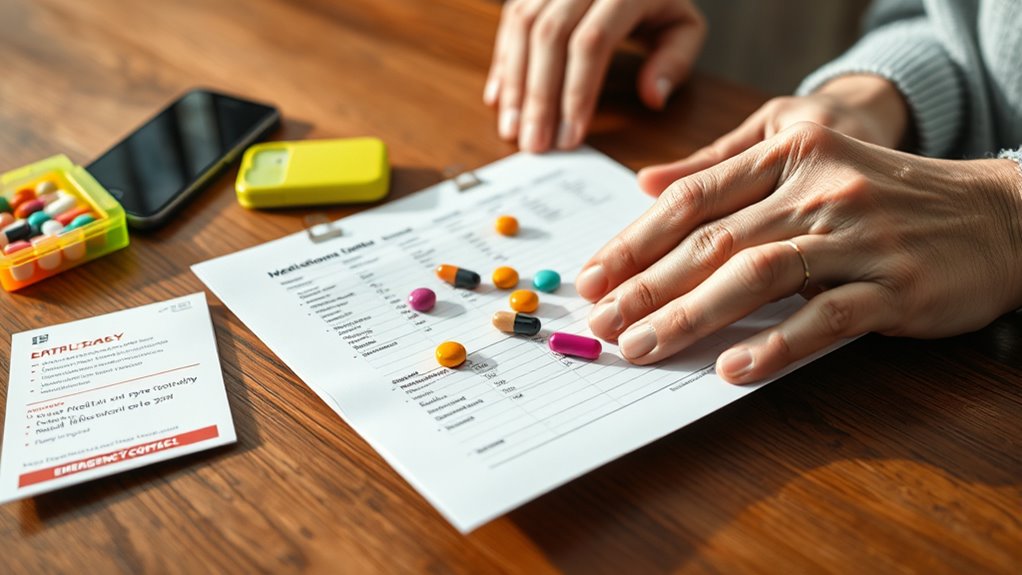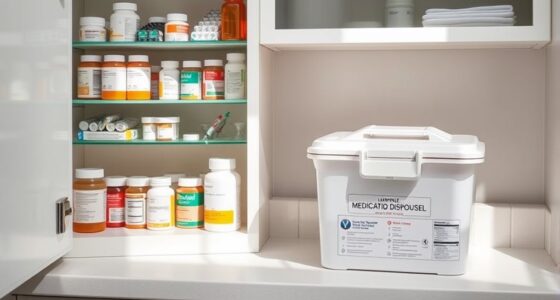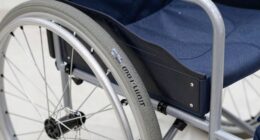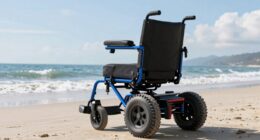To create a medication list and emergency info for seniors, gather details on all prescriptions, over-the-counter drugs, vitamins, and supplements, including names, dosages, and prescribers. Don’t forget allergies, medical conditions, and emergency contacts. Keep this info accessible in your wallet, phone, or a secure app, and update it regularly. Carry a medical alert ID and develop a plan in case of emergencies. Continue exploring for expert tips to stay prepared and protected.
Key Takeaways
- Gather all medications, including prescriptions, over-the-counter drugs, vitamins, and supplements, with details like names, dosages, and prescribers.
- Keep the list accessible in multiple locations (wallet, digital apps, emergency kit) and update regularly with any changes.
- Include critical medical info such as allergies, medical conditions, emergency contacts, and special instructions for quick reference.
- Use medical alert IDs and create a comprehensive emergency plan to ensure swift response during crises.
- Train caregivers and family members to access and use the information efficiently, ensuring safety and proper care.
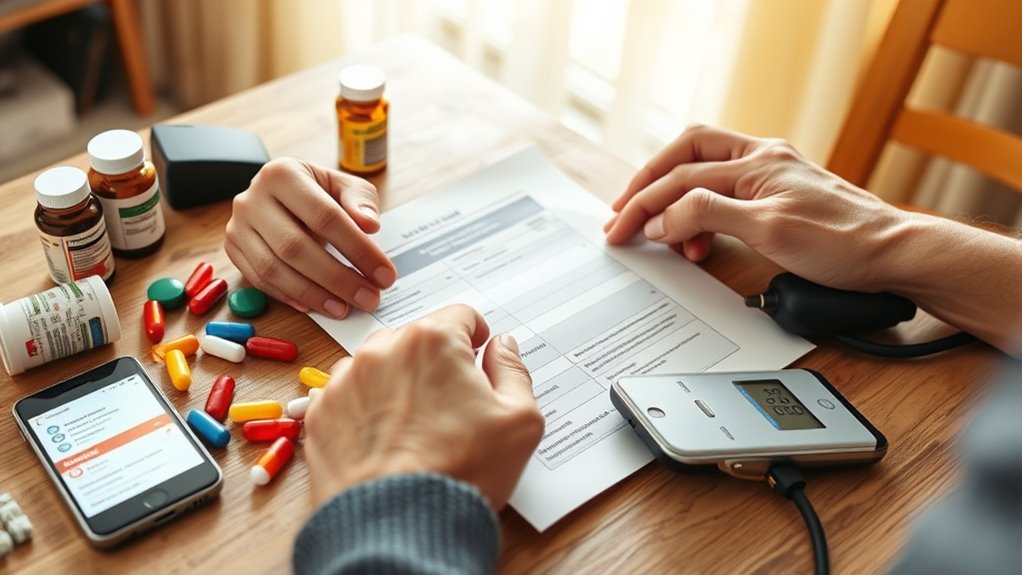
Creating a complete medication list and emergency information for seniors is essential for ensuring their safety and quick response in urgent situations. When an emergency arises, knowing exactly what medications your senior loved one takes can make all the difference in providing timely and effective care. This not only supports medication safety but also streamlines emergency preparedness, allowing first responders and medical teams to act swiftly without delays caused by uncertainty or missing information.
Start by gathering all prescription medications, over-the-counter drugs, vitamins, and supplements your senior takes regularly. Include the medication name, dosage, frequency, and the prescribing doctor’s contact information. Keep this list easily accessible, such as in a wallet, purse, or a dedicated emergency kit, so it’s always within reach. It’s *crucial* to update this list whenever medications change to *guarantee* accuracy. Medication safety depends on clear, current information, reducing the risk of adverse drug interactions or missed doses during emergencies.
In addition to medications, compile a list of allergies, sensitivities, and any medical conditions your senior has. This information can be lifesaving if they’re unable to communicate during a crisis. Make sure to include emergency contacts—family members, close friends, and healthcare providers—along with their phone numbers. Also, note any special instructions, like whether a senior has a pacemaker or requires particular assistance, so responders understand their needs quickly.
Many seniors have complex health histories, and having a *comprehensive* emergency info sheet helps caregivers and emergency personnel understand their background at a glance. Consider digitizing this information using secure apps or cloud storage, but don’t forget to keep printed copies in accessible places. This way, even if technology fails, *vital* info is still available.
Creating a well-organized emergency plan that includes this information enhances overall emergency preparedness. Encourage your senior loved one to carry a medical alert ID or bracelet that notes critical health details and allergies. Train family members and caregivers on how to access and utilize the medication list and emergency info during a crisis, which minimizes confusion and delays. Being aware of essential oils and their safety precautions can also be helpful if seniors use aromatherapy for relaxation or health benefits, ensuring safe practices during emergencies.
Ultimately, taking the time to establish and regularly update a *comprehensive* medication list and emergency information fosters peace of mind. It *assures* that everyone involved in their care is prepared, safe, and capable of providing the right support quickly. By prioritizing medication safety and emergency preparedness, you help safeguard your senior loved one’s health and well-being in everyday life and during unexpected emergencies.
Frequently Asked Questions
How Often Should Medication Lists Be Updated for Accuracy?
You should update your medication list whenever you have a medication review, such as during doctor visits or if your prescriptions change. Regularly reviewing and updating your health record guarantees accuracy, especially when new medications are added or dosages change. Aim to check and update your medication list at least every 3 to 6 months, or more often if your health condition or prescriptions frequently change, to stay safe and well-informed.
What Should I Do if a Medication Is Missing From the List?
If a medication is missing from the list, you should perform medication reconciliation promptly. Update the list with the correct medication details, including dosage and frequency, and confirm with your healthcare provider. This step is essential for emergency preparedness, ensuring all medications are accurately documented in case of emergencies. Regularly reviewing and updating the list helps prevent errors and keeps your medication information reliable and current.
How Can I Ensure Emergency Contacts Are Always Current?
To keep emergency contacts always current, you should regularly perform contact updates and emergency contact verification. Set a reminder every few months to review and confirm your contacts’ information. Reach out directly to your emergency contacts to verify their details and ensure they’re willing to assist if needed. Keeping this info accurate helps responders contact the right people quickly, providing peace of mind and better safety for you.
Are There Digital Tools to Help Manage Medication and Emergency Info?
Yes, digital health records and medication management apps can simplify your life. These tools keep your medication list and emergency info organized and accessible anytime, reducing errors and stress. You can update details instantly, share access with caregivers, and guarantee your info stays current. With these digital solutions, managing health becomes more efficient, giving you peace of mind and confidence in your safety.
What Steps Should I Take if a Senior Forgets Their Medication Details?
If a senior forgets their medication details, first focus on medication safety by checking any written records or digital tools they use. Use memory aids like pill organizers or reminder apps to help them recall their schedule. Encourage them to consult their healthcare provider or pharmacist for clarification. Always guarantee they have a secure, accessible way to store emergency info, so they can quickly access it when needed.
Conclusion
Creating a detailed medication list and emergency info can greatly improve your safety and peace of mind. Did you know that medication errors contribute to over 1.5 million hospitalizations each year? Staying organized helps prevent mistakes and ensures help arrives quickly if needed. Take a few minutes to update your info regularly—your health and independence depend on it. Being prepared not only protects you but also provides your loved ones with reassurance.
